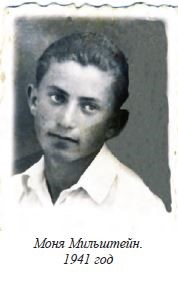
Monia Milshtein, 1941
Moisei, or Monia, Milshtein was born in 1924 in the shtetl of Zgurița (Zguritsa), in the Romanian province of Bessarabia. He studied at a gymnasium of the Tarbut network, where the teaching was conducted in Romanian and Hebrew. Then he continued his studies at a lyceum in nearby Soroca. According to the recollection of his sister Bina, he took private lessons in violin, painted beautifully, was captain of a football team, and spoke five languages.[1]
In 1940 Bessarabia was annexed to the Soviet Union and Monia was compelled to continue his studies at a Russian-language school.
During the first days of the German-Soviet war, Milshtein was summoned to the enlistment office and, as a pre-conscript, was sent to be part of a "destruction battalion," whose purpose was to carry out secondary military activities. Within a short time, the destruction battalion disintegrated (the first to flee were its commanders). Hoping to find his family, Milshtein wandered around the Romanian-occupied Ukrainian-Bessarabian frontier area until he and other members of his family were imprisoned in the ghetto of Chernevtsy, 20 kilometers northeast of Mogilev-Podolskii. Part of his extended family was then imprisoned in the ghetto of Bershad. After the recapture of this area by the Red Army in March 1944, the family was reunited. Milshtein returned to Zgurița, where he was offerred the position of principal of a school in the nearby village of Popeștii de Jos, Bessarabia (now in Moldova). From there, he moved to the town of Bender (Tighina) to work on the editorial staff of the local newspaper. However, in November 1944 Milshtein volunteered for the front. He was eager to take revenge for what the German Nazis and the Romanian fascists had done to the Jews in general, as well for the suffering and death of his relatives in the ghettos of Romanian-held Transnistria.
Private Milshtein was sent to Hungary as a mortar gunner. He took part in the forcing of the Danube and in the Balaton defensive operation in March 1945. He wrote to his parents and sister: "The Danube water is red with the blood of the dead and wounded; hundreds and thousands of dead corpses are floating along the river." He also wrote that he missed them and promised his parents that he would return home alive. He noted that he was proud that he was fulfilling his sacred duty.
On April 5, 1945 Monia Milshtein was seriously wounded and was supposed to be evacuated to a hospital in the rear of the 131st Rifle Brigade. However, he did not arrive at the hospital, most probably having been killed by enemy bombing. His family was informed that he was missing in action.
[1] Also: Pomni! Zkhor!: Vospominaniia o Kholokoste byvshikh uznikov getto I kontslagerei. Rehovot, 2013, p. 150.






